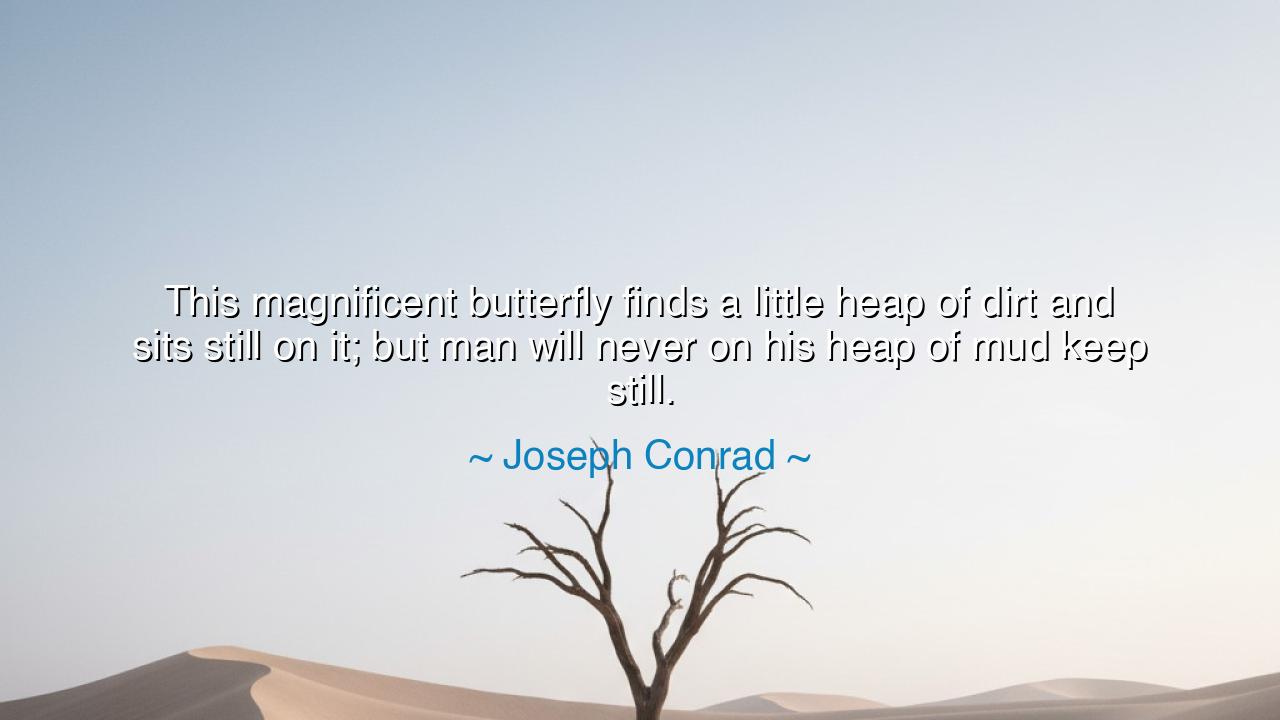
This magnificent butterfly finds a little heap of dirt and sits
This magnificent butterfly finds a little heap of dirt and sits still on it; but man will never on his heap of mud keep still.






Joseph Conrad, the voyager of seas and the chronicler of restless souls, once observed with sharpness: “This magnificent butterfly finds a little heap of dirt and sits still on it; but man will never on his heap of mud keep still.” In this vision, he sets before us a mirror of our own condition. The fragile butterfly, brief in life and delicate in form, is content to rest upon the humblest ground. Yet man, with all his strength and reason, cannot be still upon his own place. He is forever grasping, forever building, forever reaching beyond what he has, as if no soil could hold him, no moment could satisfy him.
The ancients, too, spoke of this restlessness. Heraclitus declared that no man can step into the same river twice, for all things flow and man himself is never at rest. The Stoics, weary of such ceaseless desire, taught that peace is found only in accepting one’s portion, in learning the art of stillness. The butterfly in Conrad’s words is like the Stoic sage: delicate yet wise, content with its place. But man is like the fool of Epictetus, trampling his own peace in pursuit of what lies beyond, never pausing to rest on the ground he already possesses.
We see this restlessness in the march of history. Empires rise not because they are content, but because they are driven to expand. Rome, even at its height, could not remain still. The emperors sought new lands, new wealth, new power — and in this striving, they sowed their own decline. The heap of mud upon which they sat was not enough. Compare this with the butterfly, which finds splendor not in conquest but in quiet acceptance of the moment. Conrad reminds us, in his melancholy way, that nature is wiser than man.
There is also humility in his vision. The butterfly, though small, is called “magnificent.” It teaches by its stillness, showing that beauty is not in dominion but in rest, not in accumulation but in presence. Man, with all his ambition, sits only on a heap of mud — a reminder of his mortality, his origin from dust, his inevitable return to the earth. Yet even on this mud, he is not still, as though he could defy the destiny that awaits him. The butterfly, in contrast, embraces its brief life without struggle, resting where it will, and in doing so becomes an emblem of grace.
The deeper meaning of Conrad’s words is this: that man’s tragedy lies in his refusal to be still. In always chasing, he forgets to live. The butterfly knows its life is fleeting, yet it finds contentment in the smallest of places. Man knows his life is fleeting too, but he spends it in endless agitation, as though motion itself could conquer mortality. The lesson is not to abandon striving entirely, but to balance striving with stillness, ambition with gratitude, movement with rest.
Consider the story of Siddhartha Gautama, the Buddha. Born into wealth and privilege, he saw that man’s restlessness led only to suffering. He left his palace, wandered, searched, and finally found enlightenment beneath a tree — not in restless motion, but in stillness. Like Conrad’s butterfly, he discovered that true magnificence is found in peace, not in the endless building of mud-heaps. His life became a beacon to countless generations, showing that man can, if he wills, learn to be still.
The lesson for us is clear: learn from the butterfly. In your own life, find moments where you can sit still upon your “heap of mud” — your work, your possessions, your struggles — and simply breathe. Remember that you are dust, and that no tower you build will stand forever. But also remember that like the butterfly, you can transform your fleeting life into beauty by living with presence, humility, and contentment.
Thus Conrad’s words endure as both lament and counsel: “This magnificent butterfly finds a little heap of dirt and sits still on it; but man will never on his heap of mud keep still.” Take this as wisdom for your journey. Be not forever restless. Let your soul rest, if only for a moment, upon the soil of today, and in that stillness you may discover a magnificence greater than all the restless striving of the world.






AAdministratorAdministrator
Welcome, honored guests. Please leave a comment, we will respond soon